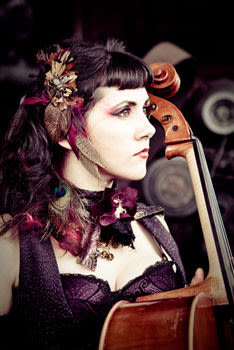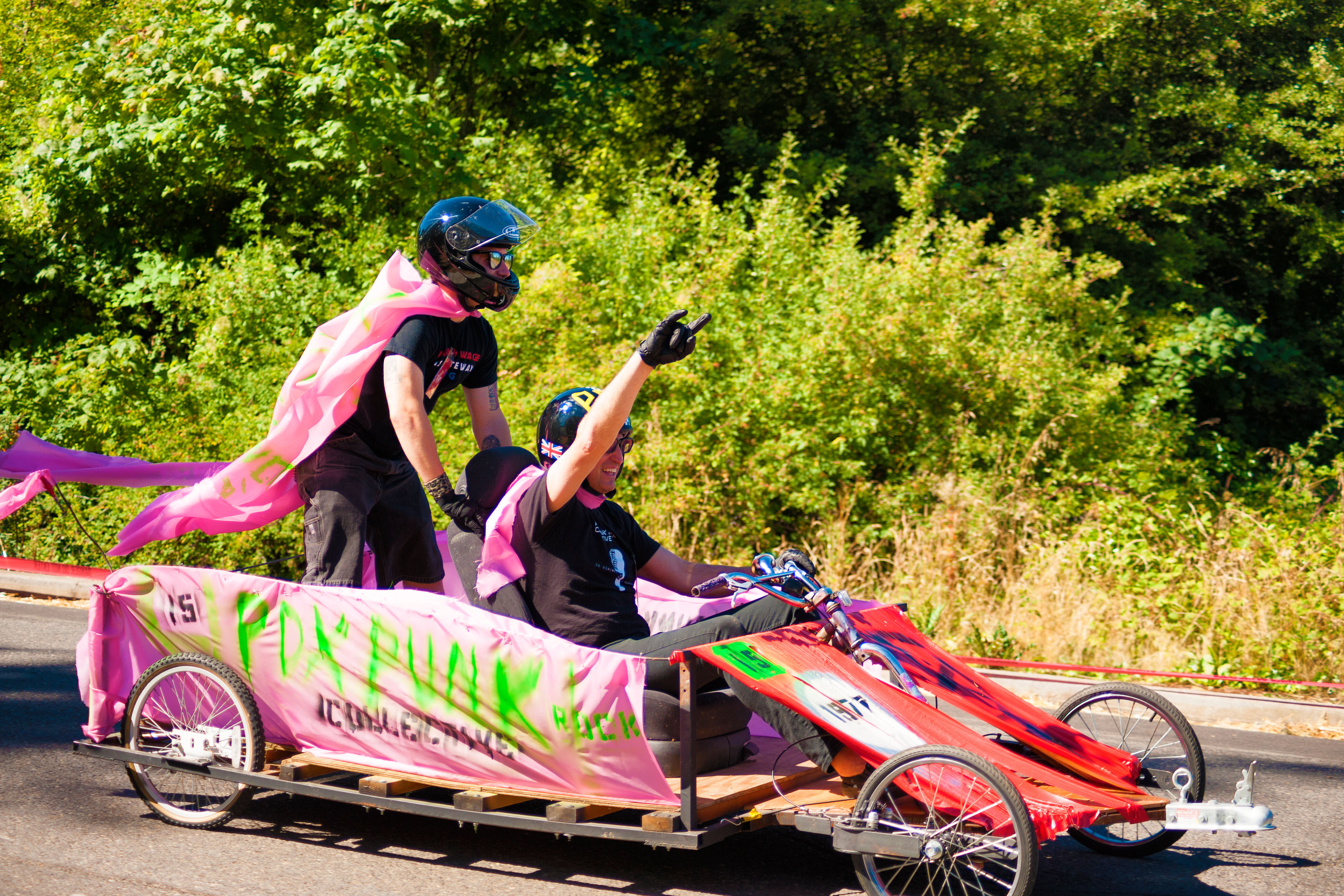Getting To Know Ashia Grzesik

Meet Ashia
When I walked into the pub on a late February evening, I knew who I was looking for: Ashia Grzisek (grr-JHI-jhek), a rising star in the Portland music scene, a classical cellist and songwriter, Vagabond Opera’s fishnet-clad flirt, a solo soprano and four-year veteran of Cirque de Soleil’s “O.” A featured nightlife expert in Portland Monthly’s Best of the City.
But who would I find? A bohemian pagan priestess? A Bearded Lady from a traveling circus?A rock star diva from beyond the sea?
In contrast to her many stage demeanors—which range from classical sublimity to burlesque bawdiness—the offstage Ashia actually blends in with the rest of the patrons, carrying herself with a youthful humility and looking as though she just got off a 9-5 job in her black pea coat, silver headscarf, and handmade red-and-white earrings that look like tiny strawberries on a bed of whipped cream. “My friend from Brazil gave them to me,” she explains. “As a Seattle area kid…I have to step up to the quirky.”
Poland to Portland
The worldly soprano siren hails from Wroclaw (vrotz-vah), Poland, but spent most of her formative years in Kent, Washington after her family fled violence and martial law during the rise of Polish Solidarity in the early 80’s. Though Grzisek’s family enjoyed their Seattle suburb, she admits the proud Poles had some difficulty assimilating. “My dad was a very strong character—very charismatic, but if he didn’t agree with you, he’d let you know. It didn’t always go over well in the workplace, with bosses.”
Now a Portlander, Grzesik feels the aforementioned cultural tension finally melting. “The Pacific Northwest has also been a closed-off community,” she adds, “It’s only been within the last decade that it’s opened up to the rest of the world.”
Once a bane and now a boon, her multiculturalism manifests in her art. Her 2007 debut album, Pay to be Loved, and 2010’s warmly-received EP Bison Rouge are infused with her international sensibilities. Loved’s dark, dreamy rendering of the French classic “Ne Me Quitte Pas;” and Polish-sung ballad “Prosto Do Nieda” off Bison particularly whisk audiences away to another time—and indeed, an older world. Her universal appeal has gotten her gigs in Canada, Germany, Japan, and Hong Kong, and of course her motherland, Poland.
“Using my last name can be tricky, though, because they don’t see me as an American artist,” says Grzesik, “They see a Polish name. They see me as the kid next door, and think ‘Ah, she’s just one of us.’ If they saw me as an American artist, they might get more excited,” she winks.
Three Eagles
“My siblings and I were all born under different eagles,” she said, referring to the emblems of Poland, Germany, and the US, “My uncle used to tease my mom, saying, ‘You’re going to have children by three different men. One will be black, one will be white, one will be striped,’ and his forecast actually came true! I was born under the white eagle [Poland], my middle sister was born in Hamburg, Germany (the black eagle) and my third sister was born in the States, under the stripes.”
Her “blended” family is highly supportive of her musical ambitions—particularly her sister, Ania, who creates “upcycled” costumes for her shows and artwork for her albums.
Ivan/Ivana?
A new twist has recently crept into Grzesik’s ever-growing stage repertoire: donning a beard and playing her usual cabaret tunes under the pseudonym “Ivan Ivana.” “He’s my long-lost twin brother,” she explains. “He’s also a parody of dark cabaret performers like me.”
I ask her if Ivan Ivana could be seen as offensive or appropriative of transgendered culture. Grzisek, after all, is a ciswoman (a woman whose biology matches her gender expression), and one could argue she is wearing a culture identity as a “costume.” Grzisek, an ally to the LGBT community, respectfully disagrees, saying Ivan Ivana lives in the world of drag: “He identifies as male, but he’s been stuck in the in-between,” she explains, “He isn’t quite sure how people see him.”
“I’m not really sure how [the transgender community] would view him,” she says, “because I haven’t performed in front of anyone who’s ‘gung-ho’ transgender. I do have friends who are [transgender], and I hope they would tell me how the felt, if they didn’t feel right about it. Yes, it is entertainment, though in the transgender, drag, and gay communities, that’s been a part of the tradition. On the stage is where we can understand, see, and transcend the self, and help the audience understand something, through the media of theatre and art.”
What’s Next
While Paid to be Loved is an album that can be classified as dark cabaret, and Grzisek is well known in Portland for her involvement in numerous cabaret-themed projects, Grzisek’s more recent Bison Rouge is a warmer, more Americana-and-pop-tinged offering. In her future projects, she intends to experiment with the ukulele, and possibly even make a foray into electronic dance music.
But tonight, she’ll play a show at Secret Society Ballroom to fundraise for new recording with recently-assembled trio Ashia and the Bison Rouge, with all the spirit, sparkle, and elegant musicianship for which she’s increasingly well-known. She’ll definitely put on a show…and if you’re good, maybe even a beard.




